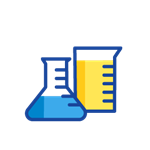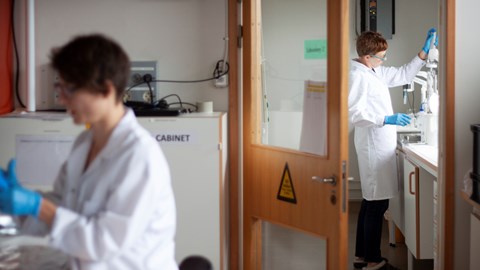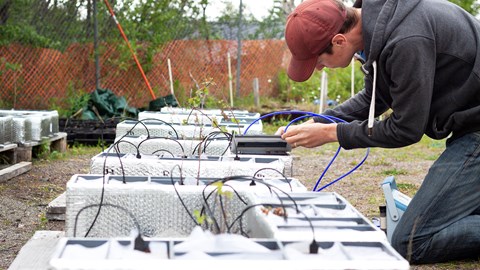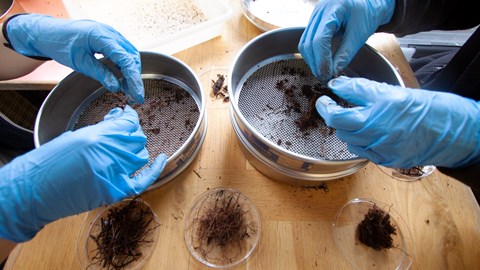Infrastructure at Abisko Scientific Research Station
In the main building, we offer accommodation and guest kitchens for visiting researchers and students. There are also laboratories, offices, workshops, lecture halls, greenhouses, experimental gardens, warehouses and a meteorological station. Outside the station area, there are a total of five field huts that researchers can use.
Abisko station area map

Accommodation
At the research station, there are a total of about 70 beds. Most rooms are twin and quadruple rooms, but there is also a limited number of triple rooms. Rooms in the D building have a private bathroom, while the rooms in Carex/Culex have shared bathrooms.
There are four shared kitchens at the research station, one on each floor of the D building, one in Carex and one in Culex. The nearest grocery store is located in the village, about 1 km from the station. For larger courses and conferences, you can order catering from restaurants in the area.
In the A building, there is a laundry room for guests as well as two saunas.
Wi-Fi is available basically across the entire station area.
You can find lounges in the D and B buildings.
Storage, including freezer and fridges
Contact the staff if you need to store samples or equipment at the station. There is plenty of unheated space for equipment that you want to leave for next season, as well as some heated space. Samples can be stored at +2 °C, -10 °C, -20 °C and -70 °C. There are also drying rooms for plants.
Don’t forget to label and register things you want to store. At the end of the season (late October/early November) we will make an inventory of all storage spaces. Any unmarked/unregistered items may then be removed for destruction – including unmarked samples!
Field equipment
Some field equipment is available to borrow at the research station.
Field huts
Abisko Scientific Research Station has a total of five field huts that you can book.
Stordalen
Myrvillan is mainly used as a day shelter and for equipment storage. There’s a parking lot along the E10, and then you have to walk about 1 km.
The monitoring infrastructure in Stordalen includes meteorology, radiation and gas flux measurements.
Latnjajaure
Latnjajaure is the most frequently used field hut, with room for ten people. There’s a weather station and a number of long-term experiments, such as the International Tundra Experiment (ITEX). The field hut is reached by helicopter all year round, in summer on foot, and in winter by snowmobile via Låktatjåkka.
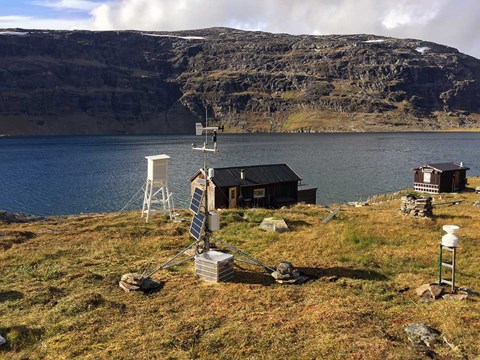
Kärkevagge
The Kärkevagge field hut can accommodate six people. In summer the hut can be reached on foot via Vassijaure, and in winter by cross-country skis or snowmobile.
Jieprenkiedde
The Jiprenkiedde field hut has bed space for two people, and it is possible for two more people to sleep on the floor. It is reached by boat from Abisko Scientific Research Station across Torneträsk. The field hut can be reached in winter by cross-country skis or snowmobile.
Lullihatjårro
The Lullihatjårro field hut can accommodate three people, there is no room to sleep on the floor. It is reached by helicopter all year round or by snowmobile in winter. It is possible to walk here in summer, but the cabin is remote.
Map of the field huts in Google Maps
Offices and work space
On the upper floor of the B building, there are four smaller work and meeting rooms. You are welcome to use these for office work if they are not booked for conferences etc.
On the first and ground floors of the A building there are offices that can be assigned to research projects. The use of these offices will be planned on a season-by-season basis by the station management. If you need access to a private office, you should include this in your application.
Lecture halls and meeting rooms
A modern lecture theatre is available in a separate building on the station area. In the B building there is an old lecture hall and five smaller meeting rooms – one on the ground floor with seating for 12–14 people, and four rooms upstairs with seating for 6–8 people each. All halls and rooms can be booked for conferences, courses etc.
Vehicles
There are three cars to rent at the station: two station wagons and a minibus. Rental cars are booked at the reception. Please coordinate the use of the cars, so as many people as possible can access them. If you need guaranteed access to a car during your visit, we recommend that you rent a car at Kiruna Airport.
The station also has two snowmobiles with sleds, which can only be used with the help of one of the station's technicians.
In Torneträsk there is also a cabin boat, which is driven by the station's technicians.
During large parts of the year, helicopter transport is available for charter in the Abisko area.
Technical service
The station’s technicians hold a wide range of skills and experience. Smaller assignments, if time is available, are free of charge. Please include in your application if you think you need more extensive support.
At the station there are car, metal, wood, paint, and electronics workshops. All guests have access to the workshops after an introduction by the technicians. Special requirements should be stated in the application.

